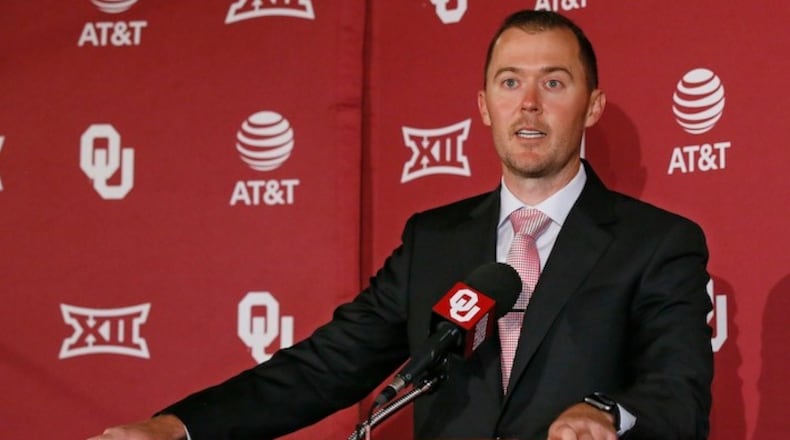Like a lot of 26-year-olds, Lincoln Riley was looking for a job in the winter of 2010.
Texas Tech head coach Mike Leach had been fired because of a player mistreatment scandal, and his staff was let go, too. For Riley, who had spent eight years at Texas Tech moving up the ladder from walk-on quarterback to student assistant to graduate assistant to wide receivers coach, that meant leaving West Texas for the first time in his life.
But first, he had a one-game audition in the Alamo Bowl on Jan. 2, 2010. Leach normally called offensive plays, so with no time to hire a new staff after Leach's dismissal, those duties fell to Riley. He made the most of the opportunity in a 41-31 win against Michigan State, catching the eye of Texas Tech interim head coach and defensive coordinator Ruffin McNeill.
"I wish I recorded Lincoln and how smooth and precise and decisive he was," McNeill said in a conference call last week. "He knew exactly how to handle everything, from the play-calling to it all, quarterbacks, everything."
When McNeill was named head coach at East Carolina, he made the young assistant his offensive coordinator. Riley's five years in Greenville catapulted him to the offensive coordinator position at Oklahoma for two seasons, and, when Bob Stoops retired on June 7, to the head coaching job with the Sooners. At 33, Riley is the youngest head coach in the Power 5 conferences.
"I had a lot of responsibility at a young age, and then also living in a different part of the country, there were a lot of changes, but I grew a ton," Riley said. "I was able to really learn on the fly. I made some mistakes, made plenty, but I had a head coach (in McNeill) that believed in me."
As one of the youngest offensive coordinators in the country, Riley could not devote all his energy to developing the game's best wide receivers like he did at Texas Tech with Michael Crabtree. He was responsible for designing schemes and game plans every week, earning on-the-job training that sped up his path to becoming a head coach.
"The jump from a position coach to a coordinator is a big jump, because now you're in charge of more players, managing coaches," Riley said. "You don't get the full taste of it, but you do get a little bit of a taste of what it's like to be in the one chair that's always a little bit lonely."
In Riley's first game with the Pirates, they threw a Hail Mary to beat Tulsa 51-49, setting the tone for five years of shootouts with a prolific passing attack. But East Carolina struggled to find consistent success until Shane Carden took over as the starting quarterback in 2012.
With Carden under center, the Pirates won eight games in 2012 and enjoyed just the second 10-win season in program history a year later. They beat three ACC teams on the road from 2012-14 and scored 70 points against North Carolina in front of an exhilarated home crowd at Dowdy-Ficklen Stadium in 2014.
Carden said Riley taught him to become decisive and less hesitant with his play-making, which helped him rewrite the school record books with his favorite target, wide receiver Justin Hardy. The duo and East Carolina's offense, which scored more than 40 points per game in 2013, quickly made Riley a rising star.
"He always used to talk about, 'Prepare for where you want to be at, not where you're at,' " Carden said. "I think everyone that's been around him isn't surprised he's a head coach right now. He always felt like a head coach to me."
McNeill said Riley turned down four job offers at bigger schools to stay at East Carolina, but when Carden and Hardy graduated after the 2014 season, it was a logical time to move on. It also helped that the offensive coordinator job opened up at Oklahoma.
"It was a place where I'd always wanted to coach, so it was one that I just couldn't turn down," Riley said.
Riley won the Broyles Award recognizing the nation's top assistant coach in his first season with the Sooners, helping Oklahoma to an appearance in the College Football Playoff. Last fall, his offense produced two Heisman Trophy finalists in quarterback Baker Mayfield and receiver Dede Westbrook.
When Stoops stepped aside abruptly after 18 seasons, Riley was the immediate choice, though his age raised eyebrows across the football world.
"The same thing happened when I hired him at East Carolina that first year. Everybody thought he was young," McNeill said. "You know when you know. I had no doubt he was ready, and once people get to know him and see how he conducts himself and handles himself, they'll see."
If Riley's youth presents a challenge, he will have at least one older voice with head coaching experience on his staff. He hired his old boss McNeill, 58, last week as his assistant head coach and defensive tackles coach.
McNeill was fired from East Carolina a year after Riley and his offensive core left, as the team regressed to 5-7, and he spent last season as the defensive line coach at Virginia.
The stakes are much higher at Oklahoma than when the duo was at Texas Tech or East Carolina, but if Riley and McNeill can replicate the success they have had together in the past, the Sooners might not miss a beat following the retirement of the winningest coach in school history.
"I trust him with my life. He's a great coach, great teacher, great person," Riley said. "I don't think there's anybody I would rather have on the staff than him."
About the Author
Keep Reading
The Latest
Featured


